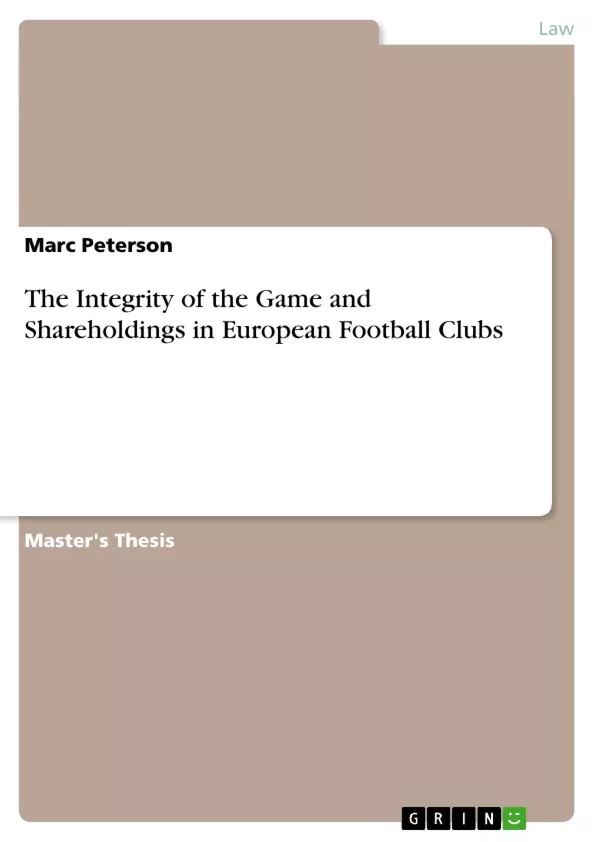The ENIC judgement of the Court of Arbitration for Sports clarified in 1999 that the UEFA regulations on multi-club ownership are necessary to maintain the integrity of football, in particular, the authenticity of results. Under the UEFA regulations, controlling interests in more than one club participating in a UEFA club competition are prohibited. However, it is not only multi-club ownership that may influence the so-called integrity of the game. Investments of clubs in other clubs (cross ownership) and shareholdings of “club-involved” persons in a club different from their own also raise issues.
The following paper therefore examines the current regulations on those shareholdings for UEFA competitions (Champions’ League and Europa League) and for national leagues in England, Spain, and Germany. The analysis provides a detailed overview of how the game’s integrity is protected and shows whether improvements seem necessary.
Inhaltsverzeichnis (Table of Contents)
- I. Introduction
- II. Organisation of Professional Football
- III. The UEFA's Regulation on Multi-Club Ownership
- (A) The ENIC Judgement
- (1) Facts of the Case
- (2) The CAS Decision and Evaluation
- (a) Multi-Club Ownership and the Integrity of the Game
- (b) European Competition Law and Fundamental Treaty Freedoms
- (3) Evaluation of the Judgement
- (B) Further Implications
- (A) The ENIC Judgement
- IV. National Regulations on Multi-Club Ownership
- (A) England, Spain, France and Italy
- (B) Germany and its "50+1 Rule"
- (C) Differences and Similarities of the Rules
- V. Cross Ownership and Investments of "Club-Involved" Persons
- VI. Risks not Covered by the Current Regulations
- VII. Ensuring Protection of Integrity
Zielsetzung und Themenschwerpunkte (Objectives and Key Themes)
This paper examines the current regulations on shareholdings in European football clubs. It aims to provide a detailed overview of how the game's integrity is protected and determine whether improvements are necessary. The paper focuses on the UEFA regulations on multi-club ownership, national regulations in England, Spain, Germany, and shareholdings of “club-involved” persons.- The impact of multi-club ownership on the integrity of the game
- The legal framework of UEFA regulations on multi-club ownership
- National regulations on multi-club ownership in various European countries
- The role of shareholdings by “club-involved” persons in affecting the game’s integrity
- The risks to the integrity of the game not covered by current regulations
Zusammenfassung der Kapitel (Chapter Summaries)
Introduction
This chapter introduces the topic of shareholdings in European football clubs, highlighting the significance of the ENIC case and its impact on the integrity of the game. It explains how the ENIC judgement led to restrictions on multi-club ownership, but also raises concerns about the potential for negative influence from shareholdings of “club-involved” persons.Organisation of Professional Football
This chapter provides an overview of the organizational structure of European professional football, including the roles of FIFA, UEFA, national associations, and regional associations. It also discusses the role of the Court of Arbitration for Sport (CAS) as an independent court for sports arbitration.The UEFA’s Regulation on Multi-Club Ownership
This chapter delves into the UEFA's regulation on multi-club ownership, focusing on the ENIC judgement and its legal assessment. It examines the case’s facts, the CAS decision, and the rule’s impact on clubs.National Regulations on Multi-Club Ownership
This chapter compares national regulations on multi-club ownership in England, Spain, France, Italy, and Germany. It highlights the differences and similarities between these regulations and assesses their consequences.Cross Ownership and Investments of "Club-Involved" Persons
This chapter analyzes shareholdings of clubs, players, coaches, and other relevant club officials in clubs other than their own. It investigates the implications of such shareholdings for the integrity of the game within UEFA competitions, England, Spain, and Germany.Schlüsselwörter (Keywords)
The core focus of this paper lies on the integrity of football games, especially regarding the authenticity of results. It explores the legal framework of UEFA regulations on multi-club ownership, national regulations in England, Spain, and Germany, and the role of shareholdings by “club-involved” persons. Important themes include the ENIC judgement, European competition law, and the “50+1 rule” in Germany.- Arbeit zitieren
- Marc Peterson (Autor:in), 2009, The Integrity of the Game and Shareholdings in European Football Clubs, München, GRIN Verlag, https://www.grin.com/document/135191



